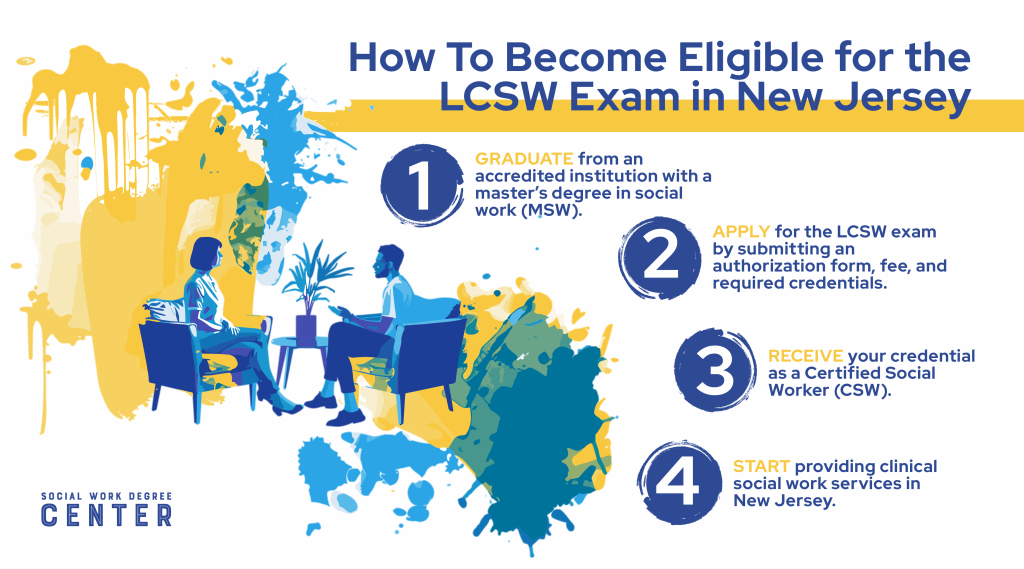
Want to know how to become a social worker in New Jersey? Follow along to learn more about the process.
Our editors first ranked how to become a social worker in New Jersey in March 2023. This ranking was updated in March 2024.
Becoming a certified social worker (CSW) requires a bachelor’s degree in social work (BSW) from an accredited college or university. You’ll also need licensing and a graduate degree (MSW) if you plan to work in certain specialties. Due to the complicated state’s ethical and legal standards set by the NASW Code of Ethics, we created this guide to answer questions about becoming a social worker in New Jersey.
Related Articles:
- What Can I Do With An Associates Degree In Social Work?
- What Jobs Can I Do with a Social Work Degree?
- Best Careers in Social Work
Steps To Become A Social Worker In New Jersey
Interested in becoming a clinical social worker in New Jersey? If so, you should consider the requirements for obtaining a Licensed Clinical Social Worker (LCSW) credential in the state. The New Jersey Division of Consumer Affairs requires successful completion of an education program and the Association of Social Work Boards (ASWB) Clinical Level Exam to become an LCSW in the state.
Here are the steps you should follow:
1. Complete a Bachelor’s Degree
The first step to becoming a certified social worker CSW is to complete a degree in social work or a related field. You can find undergraduate online social work programs in New Jersey at many colleges and universities in the state. After earning a BSW, the next step is to apply for a social work license from the New Jersey Board of Social Work Examiners.
2. Get Licensed
After graduating from an accredited master’s program, you must complete the necessary licensing requirements in order to practice as a certified social worker. This includes passing the Association of Social Work Boards (ASWB) Master’s Exam. Once a license is obtained, a licensed clinical social worker must complete 30 hours of continuing education every two years in order to maintain the license.
3. Obtain Experience
Once you have your license, you should gain experience with human behavior in a clinical practice by working in a social services agency or similar setting . This experience will help you to become a more knowledgeable and well-rounded licensed clinical social worker.
4. Pursue Advanced Degrees
Although it is not required, pursuing an advanced degree in social work or a related field can be beneficial. This can open up more opportunities for advancement and higher salaries.
5. Stay Informed
It is important to stay informed thru continuing education of changes and developments in the field of social work, as well as any new laws or regulations that may affect your clinical practice.
How To Become Eligible For The LCSW Exam?
If you are interested in becoming an LCSW in New Jersey, make sure to review the requirements and get started on the path to success. With the right education and training, you can become a Licensed Clinical Social Worker and provide valuable services to your clients.

What Are The New Jersey Social Work Licensure Requirements?
New Jersey requires social work licensure for individuals who want to practice clinical social work, social work, or clinical social work associate in the state. To be eligible for a license, applicants must have a master’s degree in social work (MSW) from a program accredited by the Council on Social Work Education (CSWE).
After obtaining a master of social work, you must apply for and pass both the:
- Association of Social Work Boards (ASWB) Master’s Exam
- New Jersey Jurisprudence Exam
Once these exams get passed, applicants must submit a completed application form to the New Jersey Board of Social Work Examiners, including all required documents and fees.
After the application gets reviewed and approved, applicants will receive their license in the mail. Licensed social workers in New Jersey must also complete 30 contact hours of continuing education every two years to maintain their license. Additionally, they must adhere to the New Jersey State Board of Social Work Examiners Code of Professional Conduct, and complete continuing education requirements courses.

How Long Does It Take To Become A Licensed Social Worker In New Jersey?
The amount of time it takes to become a licensed clinical social worker depends largely on the individual’s specific educational and experience goals.
BSW to MSW to Licensed Social Worker
| Individuals who do not possess a degree can obtain a Master of Social Work through a four-year bachelor’s-master’s degree program. These accelerated programs include two years of undergraduate study and two years of graduate study. So, individuals can earn both their Bachelor’s and Master’s degrees at once. |
MSW to Licensed Social Worker
| It takes two years to receive a master’s degree in Social Work (MSW) from an accredited college or university if you have a BSW. Upon completion of the master of social work program, graduates must pass the Association of Social Work Boards (ASWB) exam in order to obtain their license. Depending on the school, a Master of Social Work usually takes two years to complete with full-time study. |
Post-Graduate Experience Required
| In addition to completing a Master of Social Work program and passing the ASWB exam in New Jersey, you must also complete a post-graduate supervised experience. It requires a minimum of 3,000 hours and passing a criminal background check in order to obtain a license. This process can take anywhere from 18-24 months. |
Overall, it can take anywhere from two to four years to become a licensed social worker LSW, depending on the individual’s specific education requirements and experience goals. If you are interested in a doctoral degree it would take longer.
What is the Career Outlook for Social Workers in New Jersey?
The job outlook for social workers in New Jersey is positive, with a projected job growth of 7 percent over the next decade, which is faster than the national average. Furthermore, New Jersey has a higher concentration of social workers than other states, making it an attractive place to pursue a career in this field. Independent research for job search resources for social work for those with a master’s or doctoral degree is encouraged.
| Social Work Title | Current Employment | Projected Employment (2032) | % Change (2022-2032) |
| Child, family, and school social workers | 355,300 | 374,300 | 5% |
| Healthcare social workers | 191,400 | 209,800 | 10% |
| Mental health and substance abuse social workers | 113,500 | 125,500 | 11% |
| All other social workers | 68,400 | 72,900 | 7% |
Social workers in New Jersey work in various settings, including hospitals, schools, mental health facilities, and also community centers. Additionally, they may work with individuals, families, groups, consumer affairs, or entire communities. In order to have clinical practice in New Jersey, social workers must obtain a license from the state. Licensure requires a bachelor’s degree in social work and completion of a supervised field placement.
What is the Salary Outlook for Social Workers in New Jersey?
The salary outlook for certified social workers in New Jersey is excellent. According to the Bureau of Labor Statistics, the median annual salary for social workers in New Jersey is $55,350, with the top 10% earning an average of $87,300. This is higher than the national median salary of $46,310.
| Social Work Occupations | Average Pay |
| General Social Workers | $61,420 |
| Healthcare Social Workers | $60,280 |
| Mental Health and Substance Abuse Social Workers | $51,240 |
| Child, Family, and School Social Workers | $50,820 |
Overall, the career and salary outlook for social workers in New Jersey are favorable. With a high median salary and an above-average job growth rate, social workers in the Garden State can look forward to a bright future.
Types of Careers For Clinical Social Workers:
- Clinical consultation
- Clinical supervision
- Independent research
- School social workers
What Are The Highest Paying Social Worker Jobs in New Jersey?
The highest paying licensed social worker LSW jobs in New Jersey typically require a Masters or Doctorate degree and experience in the field. Clinical social workers in New Jersey can make an average salary of $80,000, with top earners making upwards of $115,000. Mental health and substance abuse social workers can make an average salary of $60,000, with top earners making upwards of $90,000.
Child, family, and school social workers can make an average salary of $54,000, with top earners making upwards of $75,000. Healthcare social workers can make an average salary of $60,000, with top earners making upwards of $90,000. In management and administration they can make an average salary of $65,000, with top earners making upwards of $100,000.
In private practice they can make an average salary of $70,000, with top earners making upwards of $110,000. All social workers in New Jersey must have a valid license from the New Jersey Board of Social Work Examiners.
| Social Work Industry | Average Pay |
| Hospitals; state, local, and private | $66,300 |
| Local government, excluding education and hospitals | $62,390 |
| Ambulatory healthcare services | $58,690 |
| State government, excluding education and hospitals | $52,640 |
15 Skills You Need To Be A Social Worker In New Jersey
- Knowledge of New Jersey social service laws and regulations
- Understanding of case management principles
- Knowledge of community resources
- Ability to work with diverse populations
- Excellent communication, interpersonal, listening, and writing skills
- Knowledge of counseling techniques
- Knowledge of social work values and ethics
- Strong problem-solving skills
- Ability to work independently and collaboratively
- Ability to work with vulnerable clients
- Knowledge of trauma-informed care thru human services
- Knowledge of substance abuse and mental health issues
- Knowledge of the principles of advocacy
- Knowledge of crisis management
- Ability to manage a caseload

What Qualifications Do You Need To Be A Social Worker In New Jersey?
To become a licensed social worker LSW, you must have a bachelor’s degree in social work from an accredited college or university. Applicants also need 2 years of supervised post-graduate social work experience. Additionally, you must have a license from the New Jersey State Board of Social Work Examiners. The board requires that applicants pass the Association of Social Work Boards Examination, complete a criminal background check, and pass an ethics course.
Is Being A Social Worker Worth It?
Yes, being a licensed social worker can be a rewarding career. It offers a unique opportunity to make a difference in the lives of others and help them in times of need.
In New Jersey, they have the chance to work with individuals, families, and communities to address a wide range of social issues and to improve their quality of life. Social workers in New Jersey also have access to a wide variety of resources to help them in their work, including state-level funding programs and other assistance.
Additionally, the social worker profession offers competitive salaries, job security, and excellent benefits. All of these factors make it worthwhile to pursue a career as a social worker.
Sources:
- Association of Social Work Boards (ASWB)
- Bureau of Labor Statistics, U.S. Department of Labor, Occupational Outlook Handbook
- National Association of Social Workers, New Jersey Chapter

